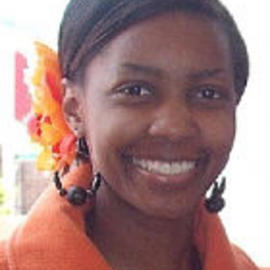Nobukhosi Ngwenya is a One Young World Ambassador, urban planner and development practitioner.
The introduction of Zimbabwe’s new constitution in 2013 marked a historic moment for women’s rights in my country. The constitution enshrines the principles of gender equality and women’s empowerment in Zimbabwean law.
But one year on and there is still a long way to go for young women in Zimbabwe.
I am twenty-eight, born free and have never voted. I am not an exception - many of my peers have never had the opportunity to vote. It is not because we do not know our rights or understand the importance of democratic participation. It is because we have been and continue to be denied meaningful participation in our political system.
During the 2013 election almost two million people under the age of 30 were left off the voters’ roll. With a female population of over 50%, this means over one million eligible female voters under the age of 30 were denied their democratic right to vote.
Despite the constitution being drafted in consultation with the Women’s Coalition, the Group of 20, another issue arises. To my knowledge, the group did not include a single woman under the age of 25. Yes, the group comprised of activists, academics and members of the women’s parliamentary caucus but with 62% of Zimbabwe’s population under the age of 25, the group’s contributions would have been greatly enhanced by the inclusion of younger women.
And women’s rights continue to be undermined by those seeking to maintain the status quo for socio-cultural, political and economic reasons. In the same month that the new constitution was passed, prominent lawyer and human rights advocate Beatrice Mtetwa was charged with ‘obstructing the course of justice and being unruly to the police’. Even though Mtetwa was acquitted in November 2013, her case is indicative of persistent attitudes towards women in Zimbabwe. In my view, the case against Mtetwa was an attempt to push her out of the public realm and tame her into the idealised 'proper' (read quiet and subservient) Zimbabwean daughter, woman, wife and/or mother.
Besides high profile cases like Mtetwa’s, serious abuses of ordinary women go relatively unnoticed and they are on the increase. A study published in December 2013 by the Ministry of Women Affairs, Gender and Community Development revealed that at least 68% of women in Zimbabwe have been subjected to gender based violence by men. This is a nationwide problem but in Harare alone more than 650 women and girls were raped in 2013. These instances of abuse are sadly most prevalent amongst the most vulnerable women in our society. A Save the Children Norway Report showed that 87.4% of girls with disabilities have been sexually abused in Zimbabwe.
The new constitution has taken us a step closer to the realisation of gender equality in Zimbabwe but it is by no means sufficient. Further action needs to be taken to protect the rights of Zimbabwe’s women, particularly the young and disabled. What is more, this work cannot be done without engaging these women and it is high time they are empowered to play a greater role in political life.
